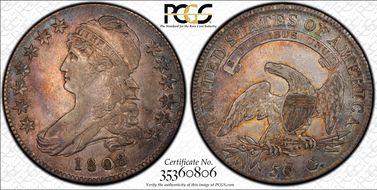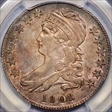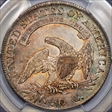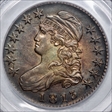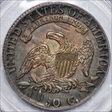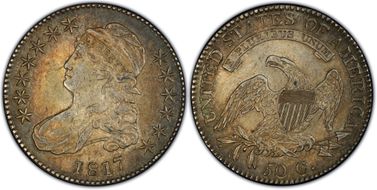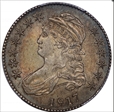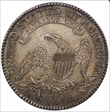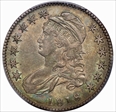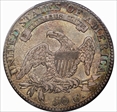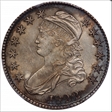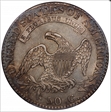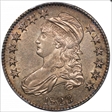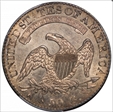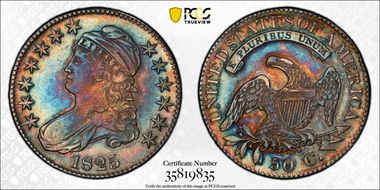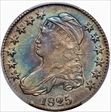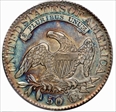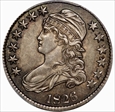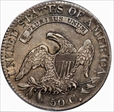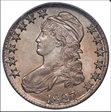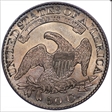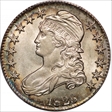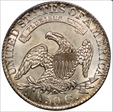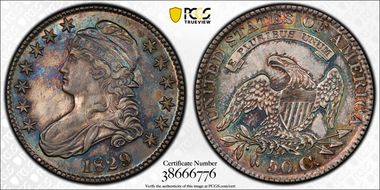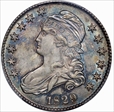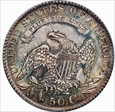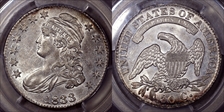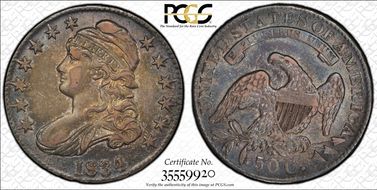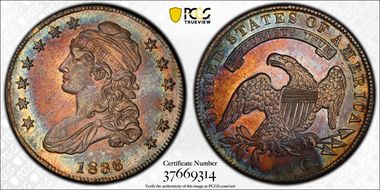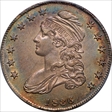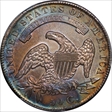obxpond 的钱币相册
1808 O-103 PCGS AU50 CAC R-1 Very nice surfaces with a touch of grey in all the right places, great luster for the grade, some pretty toning, more prominent on the reverse.
1808 O-103 PCGS AU50 CAC R-1 Very nice surfaces with a touch of grey in all the right places, great luster for the grade, some pretty toning, more prominent on the reverse.
1808 O-103 PCGS AU50 CAC R-1 Very nice surfaces with a touch of grey in all the right places, great luster for the grade, some pretty toning, more prominent on the reverse.
1813 O-103 PCGS AU50 R2 As crusty and original as they come with very nice surfaces for the grade, cool clashes and luster peering through under the colorful, more centrally located toning.
1813 O-103 PCGS AU50 R2 As crusty and original as they come with very nice surfaces for the grade, cool clashes and luster peering through under the colorful, more centrally located toning.
This splendid AU58 is a great example of a coin that has not been "treated". Its thick skin screams "original" and its toning color is progressive and authentic, pleasantly growing from rims inward. Surely from decades of album storage. Surfaces are very clean with no disturbances. Strike is solid. Rims and denticles are complete from a well centered strike. Stars are crisp with evident center points. Star 13 is not scalloped...proof that this coin was struck from an obverse die made from Scot's new master, not from Reich's (whose scalloped S13 was his signature). All in all, an original and very appealing 1817 O.110 1817...the year the Mint recovered from a devastating fire that consumed the mill house and the adjoining building with the rolling and drawing machines...the year work on the Erie Canal began...and just two years after the war of 1812 ended...CBH production resumed in earnest. Fun varieties followed. The fabulously apparent 1817 over 3 overdate. The punctuated 181.7 blunder with its broken I punch rendering cryptic reverse legend spelling. The O.106a single leaf resulting from over zealous die maintenance. And who can forget the king of all overdates, the uber rare 1817/4? 1817 is also sadly remembered as the year assistant engraver John Reich left the Mint. Chief Engraver Robert Scot took over, producing a new obverse master die which lowered the relief. 1817 yeardate strikes are generally pretty good. Weakness at the obverse center is common while reverse strikes are mostly trouble free.
This splendid AU58 is a great example of a coin that has not been "treated". Its thick skin screams "original" and its toning color is progressive and authentic, pleasantly growing from rims inward. Surely from decades of album storage. Surfaces are very clean with no disturbances. Strike is solid. Rims and denticles are complete from a well centered strike. Stars are crisp with evident center points. Star 13 is not scalloped...proof that this coin was struck from an obverse die made from Scot's new master, not from Reich's (whose scalloped S13 was his signature). All in all, an original and very appealing 1817 O.110 1817...the year the Mint recovered from a devastating fire that consumed the mill house and the adjoining building with the rolling and drawing machines...the year work on the Erie Canal began...and just two years after the war of 1812 ended...CBH production resumed in earnest. Fun varieties followed. The fabulously apparent 1817 over 3 overdate. The punctuated 181.7 blunder with its broken I punch rendering cryptic reverse legend spelling. The O.106a single leaf resulting from over zealous die maintenance. And who can forget the king of all overdates, the uber rare 1817/4? 1817 is also sadly remembered as the year assistant engraver John Reich left the Mint. Chief Engraver Robert Scot took over, producing a new obverse master die which lowered the relief. 1817 yeardate strikes are generally pretty good. Weakness at the obverse center is common while reverse strikes are mostly trouble free.
This splendid AU58 is a great example of a coin that has not been "treated". Its thick skin screams "original" and its toning color is progressive and authentic, pleasantly growing from rims inward. Surely from decades of album storage. Surfaces are very clean with no disturbances. Strike is solid. Rims and denticles are complete from a well centered strike. Stars are crisp with evident center points. Star 13 is not scalloped...proof that this coin was struck from an obverse die made from Scot's new master, not from Reich's (whose scalloped S13 was his signature). All in all, an original and very appealing 1817 O.110 1817...the year the Mint recovered from a devastating fire that consumed the mill house and the adjoining building with the rolling and drawing machines...the year work on the Erie Canal began...and just two years after the war of 1812 ended...CBH production resumed in earnest. Fun varieties followed. The fabulously apparent 1817 over 3 overdate. The punctuated 181.7 blunder with its broken I punch rendering cryptic reverse legend spelling. The O.106a single leaf resulting from over zealous die maintenance. And who can forget the king of all overdates, the uber rare 1817/4? 1817 is also sadly remembered as the year assistant engraver John Reich left the Mint. Chief Engraver Robert Scot took over, producing a new obverse master die which lowered the relief. 1817 yeardate strikes are generally pretty good. Weakness at the obverse center is common while reverse strikes are mostly trouble free.
This splendid AU58 is a great example of a coin that has not been "treated". Its thick skin screams "original" and its toning color is progressive and authentic, pleasantly growing from rims inward. Surely from decades of album storage. Surfaces are very clean with no disturbances. Strike is solid. Rims and denticles are complete from a well centered strike. Stars are crisp with evident center points. Star 13 is not scalloped...proof that this coin was struck from an obverse die made from Scot's new master, not from Reich's (whose scalloped S13 was his signature). All in all, an original and very appealing 1817 O.110 1817...the year the Mint recovered from a devastating fire that consumed the mill house and the adjoining building with the rolling and drawing machines...the year work on the Erie Canal began...and just two years after the war of 1812 ended...CBH production resumed in earnest. Fun varieties followed. The fabulously apparent 1817 over 3 overdate. The punctuated 181.7 blunder with its broken I punch rendering cryptic reverse legend spelling. The O.106a single leaf resulting from over zealous die maintenance. And who can forget the king of all overdates, the uber rare 1817/4? 1817 is also sadly remembered as the year assistant engraver John Reich left the Mint. Chief Engraver Robert Scot took over, producing a new obverse master die which lowered the relief. 1817 yeardate strikes are generally pretty good. Weakness at the obverse center is common while reverse strikes are mostly trouble free.
This splendid AU58 is a great example of a coin that has not been "treated". Its thick skin screams "original" and its toning color is progressive and authentic, pleasantly growing from rims inward. Surely from decades of album storage. Surfaces are very clean with no disturbances. Strike is solid. Rims and denticles are complete from a well centered strike. Stars are crisp with evident center points. Star 13 is not scalloped...proof that this coin was struck from an obverse die made from Scot's new master, not from Reich's (whose scalloped S13 was his signature). All in all, an original and very appealing 1817 O.110 1817...the year the Mint recovered from a devastating fire that consumed the mill house and the adjoining building with the rolling and drawing machines...the year work on the Erie Canal began...and just two years after the war of 1812 ended...CBH production resumed in earnest. Fun varieties followed. The fabulously apparent 1817 over 3 overdate. The punctuated 181.7 blunder with its broken I punch rendering cryptic reverse legend spelling. The O.106a single leaf resulting from over zealous die maintenance. And who can forget the king of all overdates, the uber rare 1817/4? 1817 is also sadly remembered as the year assistant engraver John Reich left the Mint. Chief Engraver Robert Scot took over, producing a new obverse master die which lowered the relief. 1817 yeardate strikes are generally pretty good. Weakness at the obverse center is common while reverse strikes are mostly trouble free.
1818 O-113 R4 PCGS XF45 Tougher die marriage with nice eye appeal. Pretty toning and nice surfaces with a good amount of luster for the grade.
1818 O-113 R4 PCGS XF45 Tougher die marriage with nice eye appeal. Pretty toning and nice surfaces with a good amount of luster for the grade.
1818 O-113 R4 PCGS XF45 Tougher die marriage with nice eye appeal. Pretty toning and nice surfaces with a good amount of luster for the grade.
1818 O-113 R4 PCGS XF45 Tougher die marriage with nice eye appeal. Pretty toning and nice surfaces with a good amount of luster for the grade.
1822 AU55 O.114 R3 Ex-Dosier, ex-Prouty. Bought from Lance Keigwin - 1822 would have been a forgettable year for the CBH series were it not for two notable varieties. The peculiar button-cap O.107. And the Large E's varieties (O.114 and O.115). Here's an example of the latter, from the Elton Dosier and Gehring Prouty collections. Note the larger E's in the legend. These somewhat scarce varieties are accompanied by A's with missing inner serifs (an ideal way to spot the variety). This half has a very respectable strike with none of the usual weak areas, full denticles, crisp stars and clean surfaces. Medium gold/gray in color, it has excellent luster as well. The reverse die crack adds a little personality to this tough variety.
1822 AU55 O.114 R3 Ex-Dosier, ex-Prouty. Bought from Lance Keigwin - 1822 would have been a forgettable year for the CBH series were it not for two notable varieties. The peculiar button-cap O.107. And the Large E's varieties (O.114 and O.115). Here's an example of the latter, from the Elton Dosier and Gehring Prouty collections. Note the larger E's in the legend. These somewhat scarce varieties are accompanied by A's with missing inner serifs (an ideal way to spot the variety). This half has a very respectable strike with none of the usual weak areas, full denticles, crisp stars and clean surfaces. Medium gold/gray in color, it has excellent luster as well. The reverse die crack adds a little personality to this tough variety.
1822 AU55 O.114 R3 Ex-Dosier, ex-Prouty. Bought from Lance Keigwin - 1822 would have been a forgettable year for the CBH series were it not for two notable varieties. The peculiar button-cap O.107. And the Large E's varieties (O.114 and O.115). Here's an example of the latter, from the Elton Dosier and Gehring Prouty collections. Note the larger E's in the legend. These somewhat scarce varieties are accompanied by A's with missing inner serifs (an ideal way to spot the variety). This half has a very respectable strike with none of the usual weak areas, full denticles, crisp stars and clean surfaces. Medium gold/gray in color, it has excellent luster as well. The reverse die crack adds a little personality to this tough variety.
1822 AU55 O.114 R3 Ex-Dosier, ex-Prouty. Bought from Lance Keigwin - 1822 would have been a forgettable year for the CBH series were it not for two notable varieties. The peculiar button-cap O.107. And the Large E's varieties (O.114 and O.115). Here's an example of the latter, from the Elton Dosier and Gehring Prouty collections. Note the larger E's in the legend. These somewhat scarce varieties are accompanied by A's with missing inner serifs (an ideal way to spot the variety). This half has a very respectable strike with none of the usual weak areas, full denticles, crisp stars and clean surfaces. Medium gold/gray in color, it has excellent luster as well. The reverse die crack adds a little personality to this tough variety.
1823 O.104 R2 PCGS AU58 CAC What a looker! If not for the slightest rub at the high points this would be MS62 or an AU58 with a CAC gold sticker. Even amber toning exudes on both sides with just a hint of blue at portions of the rim. Smooth, hard surfaces with plentiful luster. And an unparalleled strike. Check out those curls and feathers! The hair detail for 1823's is often mushy.
1823 O.104 R2 PCGS AU58 CAC What a looker! If not for the slightest rub at the high points this would be MS62 or an AU58 with a CAC gold sticker. Even amber toning exudes on both sides with just a hint of blue at portions of the rim. Smooth, hard surfaces with plentiful luster. And an unparalleled strike. Check out those curls and feathers! The hair detail for 1823's is often mushy.
1823 O.104 R2 PCGS AU58 CAC What a looker! If not for the slightest rub at the high points this would be MS62 or an AU58 with a CAC gold sticker. Even amber toning exudes on both sides with just a hint of blue at portions of the rim. Smooth, hard surfaces with plentiful luster. And an unparalleled strike. Check out those curls and feathers! The hair detail for 1823's is often mushy.
1823 O.104 R2 PCGS AU58 CAC What a looker! If not for the slightest rub at the high points this would be MS62 or an AU58 with a CAC gold sticker. Even amber toning exudes on both sides with just a hint of blue at portions of the rim. Smooth, hard surfaces with plentiful luster. And an unparalleled strike. Check out those curls and feathers! The hair detail for 1823's is often mushy.
1825 O-104 PCGS AU55 R4 A tough die marriage with unbelievable toning on both sides. Very nice surfaces with a really good strike for the die marriage (O-104 usually found with some weakness in the reverse scroll but not this one), and nice luster for the grade. A truly one of a kind coin
1825 O-104 PCGS AU55 R4 A tough die marriage with unbelievable toning on both sides. Very nice surfaces with a really good strike for the die marriage (O-104 usually found with some weakness in the reverse scroll but not this one), and nice luster for the grade. A truly one of a kind coin
1825 O-104 PCGS AU55 R4 A tough die marriage with unbelievable toning on both sides. Very nice surfaces with a really good strike for the die marriage (O-104 usually found with some weakness in the reverse scroll but not this one), and nice luster for the grade. A truly one of a kind coin
1826 O.115 R4+ PCGS AU50 Tough die marriage with nice surfaces and a good strike (for the grade). Very nice eye appeal.
1826 O.115 R4+ PCGS AU50 Tough die marriage with nice surfaces and a good strike (for the grade). Very nice eye appeal.
1826 O.115 R4+ PCGS AU50 Tough die marriage with nice surfaces and a good strike (for the grade). Very nice eye appeal.
1826 O.115 R4+ PCGS AU50 Tough die marriage with nice surfaces and a good strike (for the grade). Very nice eye appeal.
O.119 Sq 2 O.119 From the Jules Reiver collection. Ex-Davignon, ex-Herrman Bought from Lance Keigwin
O.119 Sq 2 O.119 From the Jules Reiver collection. Ex-Davignon, ex-Herrman Bought from Lance Keigwin
O.119 Sq 2 O.119 From the Jules Reiver collection. Ex-Davignon, ex-Herrman Bought from Lance Keigwin
O.119 Sq 2 O.119 From the Jules Reiver collection. Ex-Davignon, ex-Herrman Bought from Lance Keigwin
O.120 Sq 2, Sm 8, Lg Letters R2 Lances description: Super eye appeal! Lovely pastel yellow-gold toning blankets both sides of this wonderful bust half. Touches of blue and amber on the rim. Full luster on both sides. Why is this not MS? Okay, the slightest rub exists on Liberty's breast. That's it. Have you ever seen an MS bust half with rub or friction? Of course. On top of its remarkable eye appeal -- well, as part of it -- are very nice surfaces. Some small disturbances can be found north of eagle's head. Maybe a tiny nick here and there almost too small to be seen without a loupe. Over all, give it an A- for condition. Properly graded? I suppose so. I'd call it AU62.
O.120 Sq 2, Sm 8, Lg Letters R2 Lances description: Super eye appeal! Lovely pastel yellow-gold toning blankets both sides of this wonderful bust half. Touches of blue and amber on the rim. Full luster on both sides. Why is this not MS? Okay, the slightest rub exists on Liberty's breast. That's it. Have you ever seen an MS bust half with rub or friction? Of course. On top of its remarkable eye appeal -- well, as part of it -- are very nice surfaces. Some small disturbances can be found north of eagle's head. Maybe a tiny nick here and there almost too small to be seen without a loupe. Over all, give it an A- for condition. Properly graded? I suppose so. I'd call it AU62.
O.120 Sq 2, Sm 8, Lg Letters R2 Lances description: Super eye appeal! Lovely pastel yellow-gold toning blankets both sides of this wonderful bust half. Touches of blue and amber on the rim. Full luster on both sides. Why is this not MS? Okay, the slightest rub exists on Liberty's breast. That's it. Have you ever seen an MS bust half with rub or friction? Of course. On top of its remarkable eye appeal -- well, as part of it -- are very nice surfaces. Some small disturbances can be found north of eagle's head. Maybe a tiny nick here and there almost too small to be seen without a loupe. Over all, give it an A- for condition. Properly graded? I suppose so. I'd call it AU62.
O.120 Sq 2, Sm 8, Lg Letters R2 Lances description: Super eye appeal! Lovely pastel yellow-gold toning blankets both sides of this wonderful bust half. Touches of blue and amber on the rim. Full luster on both sides. Why is this not MS? Okay, the slightest rub exists on Liberty's breast. That's it. Have you ever seen an MS bust half with rub or friction? Of course. On top of its remarkable eye appeal -- well, as part of it -- are very nice surfaces. Some small disturbances can be found north of eagle's head. Maybe a tiny nick here and there almost too small to be seen without a loupe. Over all, give it an A- for condition. Properly graded? I suppose so. I'd call it AU62.
1829 O-113a PCGS AU55 Beautifully toned on both sides with very pretty rainbow colors on the reverse. Great luster, a very nice strike, all together which make for amazing eye appeal!
1829 O-113a PCGS AU55 Beautifully toned on both sides with very pretty rainbow colors on the reverse. Great luster, a very nice strike, all together which make for amazing eye appeal!
1829 O-113a PCGS AU55 Beautifully toned on both sides with very pretty rainbow colors on the reverse. Great luster, a very nice strike, all together which make for amazing eye appeal!
1829 O-113a PCGS AU55 Beautifully toned on both sides with very pretty rainbow colors on the reverse. Great luster, a very nice strike, all together which make for amazing eye appeal!
1829 O-113a PCGS AU55 Beautifully toned on both sides with very pretty rainbow colors on the reverse. Great luster, a very nice strike, all together which make for amazing eye appeal!
0-113 (113.1) R3. Mostly brilliant with touches of color at the edges. The strike is strong throughout and well centered with pleasing luster and surfaces.
0-113 (113.1) R3. Mostly brilliant with touches of color at the edges. The strike is strong throughout and well centered with pleasing luster and surfaces.
0-113 (113.1) R3. Mostly brilliant with touches of color at the edges. The strike is strong throughout and well centered with pleasing luster and surfaces.
Beautiful green with cobalt toning, very nice luster and great surfaces 1834 Large Date, Large Letters, O-101, R1 PCGS AU 50
Beautiful green with cobalt toning, very nice luster and great surfaces 1834 Large Date, Large Letters, O-101, R1 PCGS AU 50
Beautiful green with cobalt toning, very nice luster and great surfaces 1834 Large Date, Large Letters, O-101, R1 PCGS AU 50
Beautiful green with cobalt toning, very nice luster and great surfaces 1834 Large Date, Large Letters, O-101, R1 PCGS AU 50
Beautiful green with cobalt toning, very nice luster and great surfaces 1834 Large Date, Large Letters, O-101, R1 PCGS AU 50
Beautiful color on both obv and rev. Excellent strike, very nice surfaces and luster for a 53 1836 O. 110 R1 PCGS AU 53
Beautiful color on both obv and rev. Excellent strike, very nice surfaces and luster for a 53 1836 O. 110 R1 PCGS AU 53
Beautiful color on both obv and rev. Excellent strike, very nice surfaces and luster for a 53 1836 O. 110 R1 PCGS AU 53




















